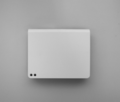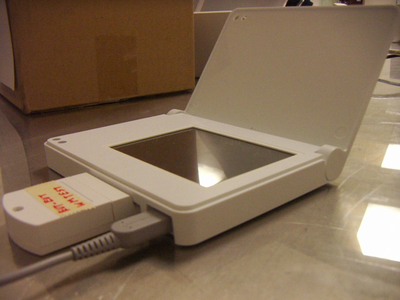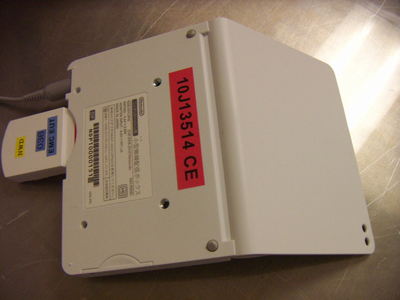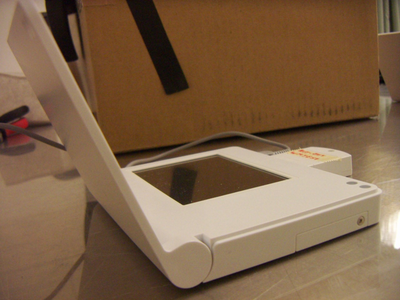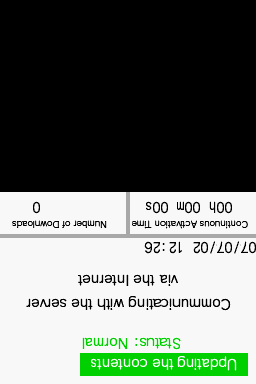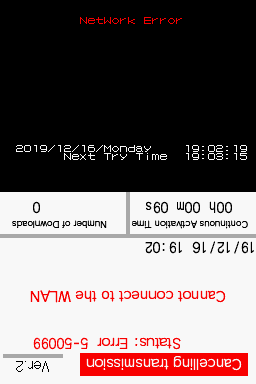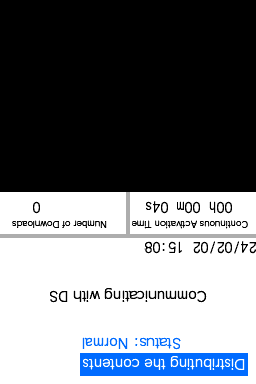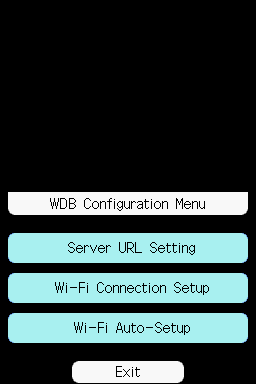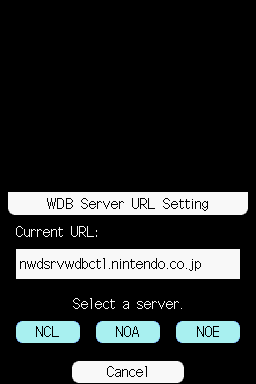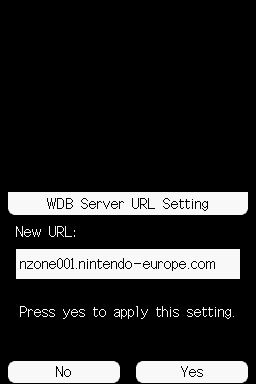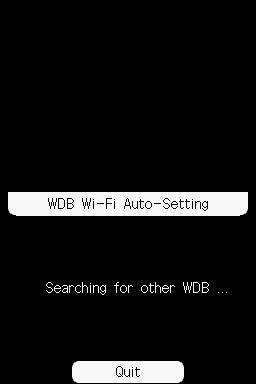Difference between revisions of "Nintendo Zone Box"
Dunkelmann (talk | contribs) (Added WDB screen which shows after downloading the contents.) |
|||
| (6 intermediate revisions by 3 users not shown) | |||
| Line 1: | Line 1: | ||
| − | |||
| + | <small>'''Note: MAC addresses have been edited away from screenshots, so what you see in the screenshots might not be what you see when you load up the roms yourself.'''</small> | ||
{{Infobox | {{Infobox | ||
| name = Nintendo Zone Box | | name = Nintendo Zone Box | ||
| Line 15: | Line 15: | ||
}} | }} | ||
| − | The '''Nintendo Zone Box''' is a special DS developed in collaboration with Nintendo and '''Mitsumi Electronics'''. This | + | The '''Nintendo Zone Box''' is a special DS developed in collaboration with Nintendo and '''Mitsumi Electronics'''. This specialized Nintendo DS can connect to Nintendo's official Nintendo Zone server with the use of a cartridge, and is the main device for creating a Nintendo Zone setup at a local wifi network. Though at the end of the day, this is just a regular Nintendo DS with a screen missing, and all of its functions can be replicated on a retail DS. |
| − | == Unit == | + | ==Unit== |
The main unit is very barebones. It has a DS cartridge and a SD Card slot, both locked away with a tab that can be unlocked by unscrewing it with a Philips screwdriver. The AC port used is a Nintendo DSi charging port, and the only way the unit can be turned on is by plugging in the AC adapter. | The main unit is very barebones. It has a DS cartridge and a SD Card slot, both locked away with a tab that can be unlocked by unscrewing it with a Philips screwdriver. The AC port used is a Nintendo DSi charging port, and the only way the unit can be turned on is by plugging in the AC adapter. | ||
2 versions of this Nintendo Zone Box exists, one with '''ZS''' on the back, which was shipped to retailers, and one with '''NDP''' on the back, which was used in-house by Mitsumi, and was later shipped to the FCC with a different code on the back. | 2 versions of this Nintendo Zone Box exists, one with '''ZS''' on the back, which was shipped to retailers, and one with '''NDP''' on the back, which was used in-house by Mitsumi, and was later shipped to the FCC with a different code on the back. | ||
| + | |||
| + | The Nintendo Zone Box is mostly the same as a retail console. The '''TWL-SUB''' board has been replaced to work without a battery, and the DSi will work without a top screen. It also won't detect a top screen if one is plugged in. Aside from that, it's a boring retail motherboard and you can put back a normal TWL-SUB board to make it "similar enough" to any other DSi. | ||
<center><gallery> | <center><gallery> | ||
| Line 34: | Line 36: | ||
File:NZB-Wallmount-Piece-2.png|This metal piece can be applied to a wall. | File:NZB-Wallmount-Piece-2.png|This metal piece can be applied to a wall. | ||
File:NZB-Wallmount-Piece-3.png|A small piece of iron that goes into the AC slot. | File:NZB-Wallmount-Piece-3.png|A small piece of iron that goes into the AC slot. | ||
| − | File:NZB-Wallmount-Screwdrivers-1.png | + | File:NZB-Wallmount-Screwdrivers-1.png|A few key-looking screwdrivers. |
File:NZB-Wallmount-Assembly-1.png|The plastic piece, screwed onto the Nintendo Zone Box. | File:NZB-Wallmount-Assembly-1.png|The plastic piece, screwed onto the Nintendo Zone Box. | ||
File:NZB-Wallmount-Assembly-2.png|The iron piece that goes into the AC slot. | File:NZB-Wallmount-Assembly-2.png|The iron piece that goes into the AC slot. | ||
| Line 41: | Line 43: | ||
File:NZB-Wallmount-Assembly-5.png|The DSi charger, held in place. | File:NZB-Wallmount-Assembly-5.png|The DSi charger, held in place. | ||
File:NZB-Wallmount-Assembly-6.png|There's a small clip that can also be applied to a wall, which keeps the charger cable in place. | File:NZB-Wallmount-Assembly-6.png|There's a small clip that can also be applied to a wall, which keeps the charger cable in place. | ||
| + | File:Nintendo Zone Box (inside).jpg|The inside of a Nintendo Zone Box, courtesy of "collection_nintendo" on instagram. | ||
</gallery></center> | </gallery></center> | ||
| − | == FCC Version == | + | ==FCC Version== |
A special version, with stickers and marked as "NDPXXXXXXXXX" was sent to the United States Federal Communications Commission. | A special version, with stickers and marked as "NDPXXXXXXXXX" was sent to the United States Federal Communications Commission. | ||
| − | <gallery widths="200px" heights="200px" mode=packed> | + | <gallery widths="200px" heights="200px" mode="packed"> |
File:NZB-NDP-1.png|The front, with a cartridge inserted that says "''EMC-EUT WMTest''". | File:NZB-NDP-1.png|The front, with a cartridge inserted that says "''EMC-EUT WMTest''". | ||
File:NZB-NDP-2.png|The bottom. | File:NZB-NDP-2.png|The bottom. | ||
| Line 54: | Line 57: | ||
The main difference from this unit is that it has the ability to read DS(i) development cartridges. This feature was removed from the ZS models. | The main difference from this unit is that it has the ability to read DS(i) development cartridges. This feature was removed from the ZS models. | ||
| − | The development cartridge also has a yellow label that says "''NWD''". It has been | + | The development cartridge also has a yellow label that says "''NWD''". It has been rumored that this stands for '''Nintendo Wi-Fi Development'''. |
| + | |||
| + | ==Nintendo Zone Beacon (DS Cart)== | ||
| + | Since the Nintendo Zone Box has no special software built into its system, all of the required Nintendo Zone Box software is on DS carts that can be used on retail hardware as well. The beacon (in case of Nintendo Zone) is the starting point for a Nintendo Zone setup. The cartridge contains a payload and a SSID. The beacon checks if the SSID matches with the SSID the DSi is currently connected to (eg. if the SSID on the cart is “BestBuy”, the SSID on the network must be the same). | ||
| + | |||
| + | Currently, one beacon cartridge is known to be dumped. This cartridge was used at Best Buy. | ||
| − | + | [[File:NZB-Beacon-BestBuy-1.png|frameless|center|The beacon's menu.]] | |
| − | |||
| − | == Nintendo Zone Wireless Distribution Box (DS Cart) == | + | ==Nintendo Zone Wireless Distribution Box (DS Cart)== |
| − | + | The Nintendo Zone WDB is the middleman for a Nintendo Zone setup, as it receives demo data from the beacon. The beacon alone cannot operate without the WDB cartridge. | |
| − | <gallery widths="300px" heights="300px" mode=packed> | + | <gallery widths="300px" heights="300px" mode="packed"> |
| − | File:NZB-WDB-Connection-1.png|WDB waiting for an internet connection and a | + | File:NZB-WDB-Connection-1.png|WDB waiting for an internet connection and a beacon over the same network. |
File:NZB-WDB-Connection-2.png|WDB fails to connect to the internet. | File:NZB-WDB-Connection-2.png|WDB fails to connect to the internet. | ||
| + | File:NZB-WDB-Connection-3.png|WDB communicating with another DS system. | ||
</gallery> | </gallery> | ||
Holding down the touch screen on startup reveals the settings. From here, you can change the Nintendo Zone servers, search for more systems that are running the WDB software and setup an internet connection, which is the same menu seen in various WFC-enabled games like Mario Kart DS. | Holding down the touch screen on startup reveals the settings. From here, you can change the Nintendo Zone servers, search for more systems that are running the WDB software and setup an internet connection, which is the same menu seen in various WFC-enabled games like Mario Kart DS. | ||
| − | <gallery widths="300px" heights="300px" mode=packed | + | <gallery widths="300px" heights="300px" mode="packed"> |
File:NZB-WDB-Settings-1.png|The main menu. | File:NZB-WDB-Settings-1.png|The main menu. | ||
File:NZB-WDB-Settings-2.png|Selecting your Nintendo Zone server of choice. | File:NZB-WDB-Settings-2.png|Selecting your Nintendo Zone server of choice. | ||
| Line 76: | Line 84: | ||
</gallery> | </gallery> | ||
| − | == Documents == | + | ==Documents== |
<center> | <center> | ||
<pdf width="500" height="550">File:NZB_MANUAL.pdf</pdf> | <pdf width="500" height="550">File:NZB_MANUAL.pdf</pdf> | ||
| Line 87: | Line 95: | ||
<pdf width="500" height="550">File:10J13513-1_FCC_IC_DTS_WLAN_C2PC_Test_Report_Final.pdf</pdf> | <pdf width="500" height="550">File:10J13513-1_FCC_IC_DTS_WLAN_C2PC_Test_Report_Final.pdf</pdf> | ||
</center> | </center> | ||
| + | |||
| + | ==References== | ||
| + | [https://www.youtube.com/watch?v=Dlw0wRlsjjA Nintendo Zone operating on a Nintendo DS Lite] | ||
| + | [https://fccid.io/EW4DWMW024 Source for manuals and info on FCCID.io] | ||
Latest revision as of 14:21, 2 February 2024
Note: MAC addresses have been edited away from screenshots, so what you see in the screenshots might not be what you see when you load up the roms yourself.
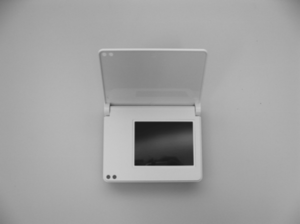 The Nintendo Zone Box, opened | |
| FCC ID | DWMW024 |
|---|---|
| Model Number | NZB-001 |
| Title ID | LSA-NZB-S-USZ |
The Nintendo Zone Box is a special DS developed in collaboration with Nintendo and Mitsumi Electronics. This specialized Nintendo DS can connect to Nintendo's official Nintendo Zone server with the use of a cartridge, and is the main device for creating a Nintendo Zone setup at a local wifi network. Though at the end of the day, this is just a regular Nintendo DS with a screen missing, and all of its functions can be replicated on a retail DS.
Contents
Unit
The main unit is very barebones. It has a DS cartridge and a SD Card slot, both locked away with a tab that can be unlocked by unscrewing it with a Philips screwdriver. The AC port used is a Nintendo DSi charging port, and the only way the unit can be turned on is by plugging in the AC adapter.
2 versions of this Nintendo Zone Box exists, one with ZS on the back, which was shipped to retailers, and one with NDP on the back, which was used in-house by Mitsumi, and was later shipped to the FCC with a different code on the back.
The Nintendo Zone Box is mostly the same as a retail console. The TWL-SUB board has been replaced to work without a battery, and the DSi will work without a top screen. It also won't detect a top screen if one is plugged in. Aside from that, it's a boring retail motherboard and you can put back a normal TWL-SUB board to make it "similar enough" to any other DSi.
On the back are 2 screwholes for mounting the unit onto a wall. Screws and mounting pieces are included.
FCC Version
A special version, with stickers and marked as "NDPXXXXXXXXX" was sent to the United States Federal Communications Commission.
The main difference from this unit is that it has the ability to read DS(i) development cartridges. This feature was removed from the ZS models.
The development cartridge also has a yellow label that says "NWD". It has been rumored that this stands for Nintendo Wi-Fi Development.
Nintendo Zone Beacon (DS Cart)
Since the Nintendo Zone Box has no special software built into its system, all of the required Nintendo Zone Box software is on DS carts that can be used on retail hardware as well. The beacon (in case of Nintendo Zone) is the starting point for a Nintendo Zone setup. The cartridge contains a payload and a SSID. The beacon checks if the SSID matches with the SSID the DSi is currently connected to (eg. if the SSID on the cart is “BestBuy”, the SSID on the network must be the same).
Currently, one beacon cartridge is known to be dumped. This cartridge was used at Best Buy.
Nintendo Zone Wireless Distribution Box (DS Cart)
The Nintendo Zone WDB is the middleman for a Nintendo Zone setup, as it receives demo data from the beacon. The beacon alone cannot operate without the WDB cartridge.
Holding down the touch screen on startup reveals the settings. From here, you can change the Nintendo Zone servers, search for more systems that are running the WDB software and setup an internet connection, which is the same menu seen in various WFC-enabled games like Mario Kart DS.
Documents
References
Nintendo Zone operating on a Nintendo DS Lite Source for manuals and info on FCCID.io
